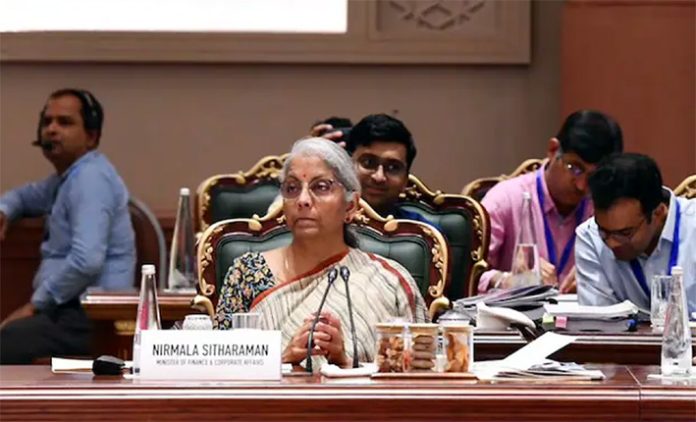NEW DELHI, Jun 22: The GST Council on Saturday decided to tweak tax rates on items, including accommodation services for students and solar cookers, and took a host of taxpayer-friendly measures including waiver of interest and penalty for demand notices issued in the first three years of GST rollout.
Briefing reporters after the 53rd GST Council meeting, Finance Minister Nirmala Sitharaman said the Council has recommended to roll-out the biometric-based Aadhaar authentication of registration applicants on pan-India basis in a phased manner. This will help check fraudulent registration done to avail input tax credit and evade taxes.
To reduce litigation, the Council decided to fix a monetary limit for tax officers to file appeals before the GST Appellate Tribunal, the High Court and the Supreme Court at Rs 20 lakh, Rs 1 crore and Rs 2 crore, respectively.
It also recommended reduction of the quantum of pre-deposit required to be paid by taxpayers for filing of appeals under Goods and Services Tax (GST).
The maximum amount of pre-deposit for filing appeal with the appellate authority has been reduced from Rs 25 crore CGST and SGST each to Rs 20 crores CGST and SGST each. This will help ease cash flow and working capital blockage for the taxpayers.
“The 53rd GST Council meeting has taken a number of decisions on trade facilitation, easing compliance burden and giving relief to taxpayers in terms of easing compliance,” Sitharaman said.
The Minister said the next meeting of the GST Council will be held in August in which the Group of Ministers (GoM) on GST rate rationalisation under Bihar Deputy Chief Minister Sumant Chaudhary, will give a presentation on the status of the work and aspects covered by the panel and work pending before the panel.
“What was decided in the Council is, when we meet in the next GST Council meeting we will start a discussion on rate rationalisation… There will be a presentation by the GoM irrespective of whether the report is draft… And then Council will start the discussion on rate rationalisation in the next meeting in August,” Sitharaman said.
The GST Council on Saturday recommended to exempt Accommodation Services of up to Rs 20,000 per person per month from GST. This is subject to the condition that these services are supplied for a minimum continuous period of 90 days. “It’s primarily meant for students,” Sitharaman said.
In a taxpayer friendly move, the Council has decided to waive interest and penalties for demand notices issued under Section 73 of the CGST Act (for cases not involving fraud, suppression or wilful misstatement) for the fiscal years 2017-18, 2018-19 and 2019-20, if the full tax demanded is paid by March 31, 2025.
GST, which subsumed 17 local taxes and cesses, was rolled out on July 1, 2017.
With its prices of various products and services used by masses have moderated.
As per the CBIC data, mobile phones and many household items including TV, refrigerator, washing machine and AC have become cheaper post GST.
It has reduced burden on household income and improved affordability.
The Council also decided to refer the standing committee’s recommendation to exempt GST on fertiliser and cut rates on raw materials to the GoM on rate rationalisation.
Currently, GST is levied at 5 per cent on fertilisers, while its raw materials like sulphuric acid and ammonia face 18 per cent tax.
Also the Tax Collected at Source (TCS) rate for e-commerce suppliers has been cut from present 1 per cent to 0.5 per cent, which will ease the financial burden on the suppliers making supplies through E-commerce platform.
Besides, services provided by Indian Railways to the general public, namely, sale of platform tickets, facility of retiring rooms/waiting rooms, cloak room services and battery-operated car services as well as intra-railway transactions would be exempt from GST.
GST Council has prescribed a uniform rate of 12 per cent on all milk cans meaning steel, iron, aluminum which are irrespective of the use.
The Council also recommended a uniform GST rate of 12 per cent on all carton boxes and cases of both corrugated and non-corrugated paper or paper board, which in particular, help the apple growers of Himachal Pradesh and Jammu & Kashmir.
All types of Sprinklers, including fire water sprinklers, will attract 12 per cent GST. Solar Cookers, whether it has a single or dual energy source, too will attract a 12 per cent tax.
The Council also decided that GST anti-profiteering provisions will have a sunset date of April 1, 2025. Current cases and investigations with regard to profiteering complaints will be handled by the Principal bench of GST Appellate Tribunal (GSTAT), instead of the Competition Commission of India (CCI).
Also, the time limit to avail input tax credit w.R.T. Any invoice or debit note through any GSTR 3B return filed up to November 30, 2021 for FY 2017-18, 2018-19, 2019-20 and 2020-21, has been fixed at November 30, 2021.
Sitharaman said less than two per cent of the total 58.62 lakh taxpayers under Central GST administration has been sent tax notices and the intention of the government is to make GST assessees life easier by reducing compliance requirements.
“I want to reassure the assessees that our intent is to make GST assessees life easier, we are working towards less and less compliance. On behalf of the CGST, notices are not being sent left, right and centre. Only 1.96 per cent of all active tax assessees have been sent notices from Central GST,” Sitharaman said. (PTI)
Trending Now
E-Paper


